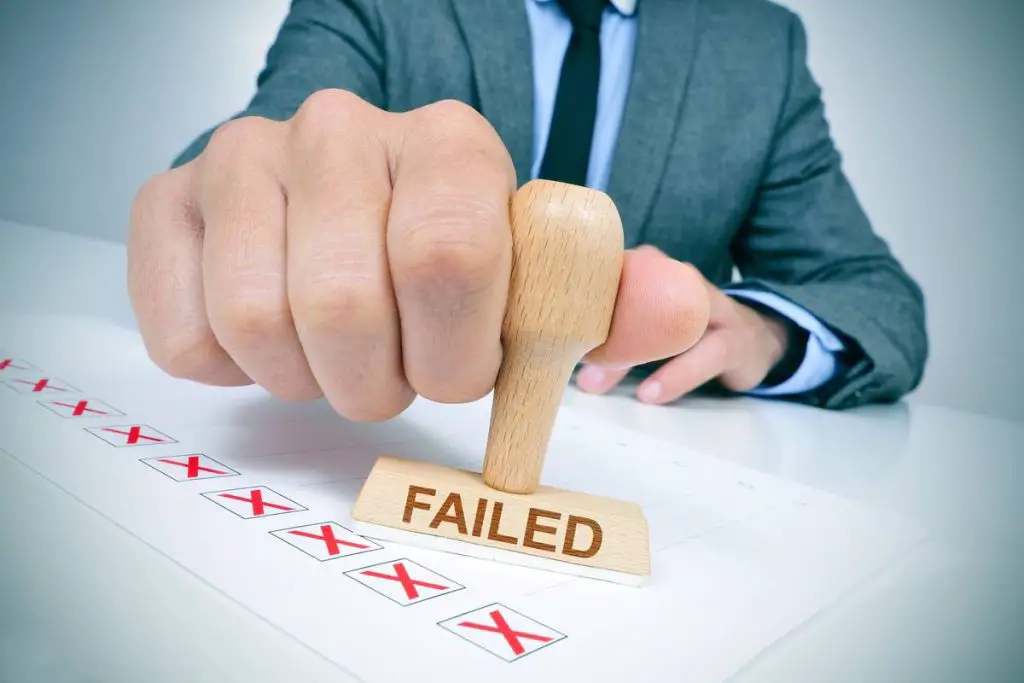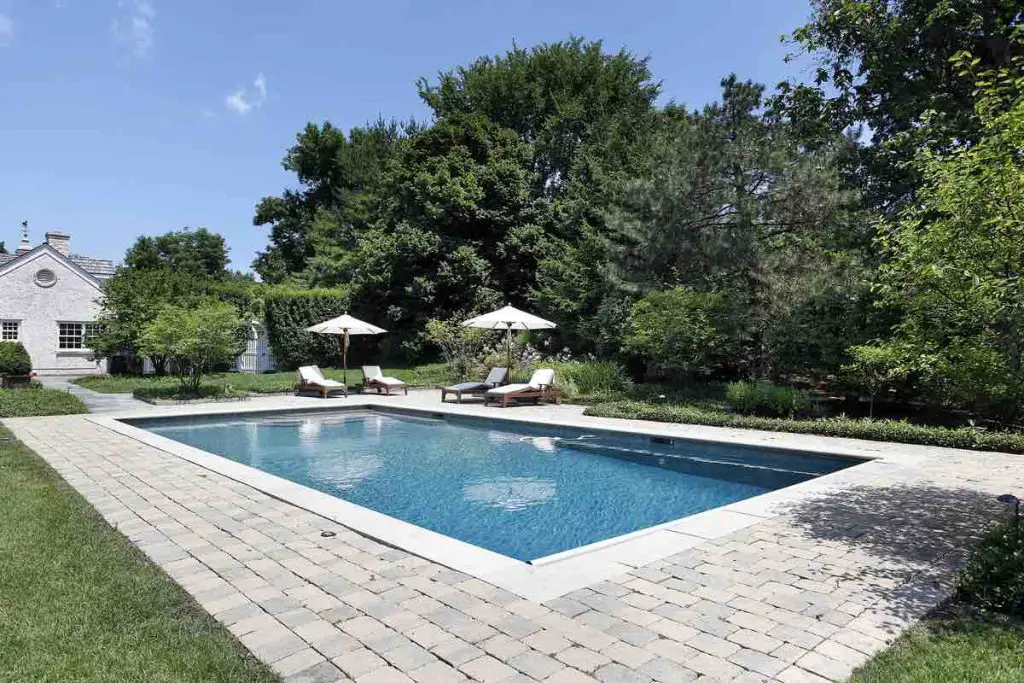When buying or selling a house with a pool, a pool inspection is vital to ensure everything is safe and working. A pool inspector will thoroughly check for damage and other issues, and there are a few things that could cause the inspection to fail.
A pool inspection might fail due to a damaged pool liner, improper drainage, filter issues, unstable pool equipment, damaged or unsafe decking, and inadequate hygiene standards. Depending on the agreement, the seller or buyer must rectify the problems if the inspection fails.
If you are planning to buy or sell a house with a pool, you must learn more about why a pool might fail inspection. Keep reading to learn more.

1. Pool Inspectors Will Check if Your Pool Liner Is Damaged
A pool inspector will examine the pool liner for signs of visible damage. They will look for things like:
- Cracks. Cracks in a pool liner may not cause the inspection to fail, but it could indicate that the liner is deteriorating and you need to replace it.
- Holes and chips. Holes and chips can be a problem in a pool, and an inspector will check to make sure there are none. If there are holes or chips in the liner, water loss is probable, and you will likely need to replace the liner. Sometimes, however, you can fill in the holes.
- Wear and tear. Pool liners can generally last 10-15 years, but that doesn’t mean they always do. An inspector will check for general wear and tear, including color fading. They might suggest replacing the liner if there is significant wear and tear.
According to Bob Vila, the average cost for pool liner replacement in the US is $2,327. So, getting an inspector to check the pool liner is vital because it allows you to prepare financially for any costly repairs.
2. Inspectors Will Check for Improper Drainage
An inspector will always check the drainage system of a pool during an inspection, and if it isn’t working correctly, it will likely fail. The pool’s drains are some of the essential parts of a pool’s drainage system. These are generally found on the ground beside the pool and look like any other standard drain.
If these drains are clogged or damaged in any other way, the pool water is more likely to flow into the yard, which could cause further damage. It could also cause mold and mildew issues around the pool and yard, which can be costly and a nuisance to fix.
An inspector will make sure the water is draining, and they will look for signs of damage. Improper drainage can also contaminate the water and create a slippery surface around the pool, which is dangerous because it increases the chance of injury from slipping.
If an inspection concludes that a pool doesn’t have proper drainage, you will need to fix the issue.
3. Filter Issues Are Part of the Pool Inspection
Filters help to keep pools clean and free from debris, so they must work correctly. If a filter isn’t working, the pool will look dirtier than it should. A pool with improper filtration is more likely to cause health issues like diarrhea and respiratory infections, which can be dangerous for some people.
So, an inspector will always make sure a pool’s filter is working. If it’s not working, there could be various reasons behind it. For example, a blockage in the filter can stop it from working.
The inspector can tell you why the filter isn’t working and whether it needs to be repaired or replaced. Most pool filter cartridges should last from 3-5 years.
4. Unstable Pool Equipment Is Part of the Inspection
Installing unstable pool equipment, including a loose or faulty ladder, is dangerous. If something is defective, it’s more likely to cause injury, which you always want to avoid! With enough weight or force, some equipment might even fall off entirely.
A pool inspector will always check pool equipment to ensure nothing is loose or rickety. If they aren’t happy with something (i.e., a diving board is not secure), the buyer or seller will need to rectify the issue by removing or replacing the equipment.
All equipment should be steady without moving around during use.
5. Inspectors Will Check for Damaged or Unsafe Decking
You might only expect a pool inspector to examine the pool itself, but they will also look at the surrounding area, including the decking. One of the things they will check in this area is the drainage, which I mentioned earlier.
But they will also look for damage, including cracks and chips. Inspectors may declare your decking unsafe if it remains wet and slippery. If your pool remains in this state for extended periods rather than drying quickly—this would be a health and safety hazard. If this is the case, the buyer or seller must replace or treat the decking so it’s no longer slippery.
For example, the decking may need to be treated with anti-slip paint if it isn’t already. If a concrete decking has lots of damage, including cracking, the inspector might recommend resurfacing. Other solutions are available for small cracks, including filler.
6. Inspectors Will Check Your Pool Hygiene Standards
If a pool isn’t hygienic, it will fail an inspection for health and safety reasons. I mentioned earlier that you could become ill in a pool if the filter isn’t working, but you can also become sick if there isn’t enough chlorine in the water.
Chlorine kills germs, so without it, you’re likely to get things like:
- Skin rashes
- Stomach issues, including diarrhea and vomiting
- Ear infections
- Parasites like giardia
An inspector may use a dipping test strip to check the chlorine levels in a pool. The inspection could fail if there isn’t enough chlorine, and the buyer or seller must rectify the issue. Thankfully, this one is easy to fix because it mainly involves adding more chlorine, and there’s nothing to repair.
Do you know how long the pool inspection takes? Click on the link to read my guide on it. You’ll also find out the items pool inspectors examine and the benefits of pool inspection.

Conclusion
A pool inspection is vital if you’re planning on buying or selling a house with a pool because it will give you an idea of the issues and how much they might cost. After reading this article, you should better understand what can cause a pool to fail the inspection and what the solutions might be.
Depending on the agreement, the buyer or seller must rectify any issues an inspector finds in the pool.
Sources
- Total Tech Pools & Leisure: 4 SIGNS IT’S TIME TO REPLACE YOUR POOL LINER
- Bob Vila: How Much Does Pool Liner Replacement Cost?
- Flawless Image Pool Service: Why You Should Have Proper Drainage Around Your Swimming Pool
- Swim Happy Pools: What Happens If You Don’t Clean Your Pool?
- Pioneer Family Pools: HOW OFTEN SHOULD YOU CLEAN YOUR POOL’S FILTER CARTRIDGE?
- Concrete Network: POOL DECK REPAIR FOR CRACKED CONCRETE & MORE
- CDC: Water Treatment and Testing
- CDC: Facts About Giardia and Swimming Pools
- Water and Health: HOW TO INTERPRET POOL CHLORINE READINGS
